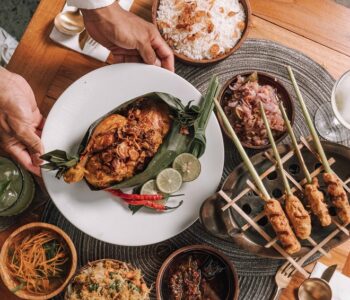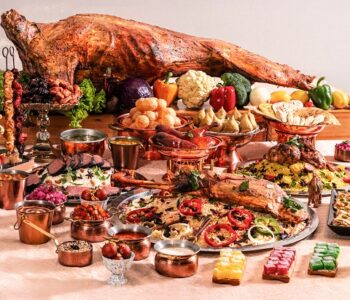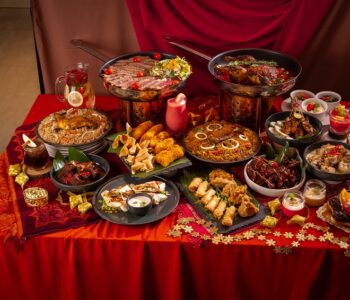Although I am essentially a home cook, I have never underestimated the power of technology to improve my cooking skills. Maybe that’s because I’m Asian – and Asians never expect to be expert in anything until they’ve got all the right equipment.

As a cook who had never cooked or baked before, the first thing I did when I decided to cook was to spend most of my savings on cooking equipment; to get the “best” standing mixer, in the hope that I could get the “best” results. And guess what? It turns out to be true (or at least, I think so!)
The equipment you use can have a real impact on the food you make, even if you follow a recipe word for word. Certain ovens for example, like a combi oven, which can both steam, bake, and combine the two together, give you totally different results from conventional ovens. Cakes are moist and baked to perfection, and quicker, and you can bake anything from appetizers to dessert at the same time without mixing the aromas and flavours. In part, this is because of the way the combi oven diffuses heat (heat is circulated horizontally for an even pastry). A combi oven is definitely on my “I must get one” list.
But it’s not just in the range of kitchen equipment – ovens and cookers, sous vide machines, and thermomix, mandolines and messermeister knives – that technology can have a real impact. The most important impact of technology on food, and the one we tend to ignore, is in the way that technology has improved the quality of ingredients, from great big beautiful cauliflowers in Britain, to the perfect rows of oranges and lemons that you see in Spanish markets. Technology is not just about having great equipment, or being connected to the Internet, but it’s also about the science and art of making good ingredients even greater.
I was overwhelmed on my first visit to Japan nine years ago, not only about how their agriculture industry has enabled them to produce the best quality of beef (think beer-fed, hand-massaged Kobe beef), but also some of the most exquisite fruit and vegetables I’ve ever had. In a back street of Ginza I had a hideously expensive kumquat (I didn’t even know what it was), the concentration of flavour of which, and the balance of sweet and tartness, has ruined all other kumquats for me for ever. I NEED to go back and find that piece of earthly delight.
But it’s not just Japan. On a recent visit to Bangkok a month ago, I realized how thin they’ve bred the stones of their mangoes, so that not only are their mangoes sweeter and more fragrant than the ones we seem to get (I know, I know, I shouldn’t be saying that), but they’re easier to peel and to eat. And if you love pomelo, just wait til you’ve tried the ones in Thailand. Somehow, the pomelos we get here seem to have lost their flavor. Back in Bangkok, they’re juicier, and more grape-fruity, and definitely very addictive.
So back to my belief as a cook. Yes, of course skill and practice play a huge part in being a great cook but the right tools and the best ingredients definitely help.
When people say that I don’t really have the skill to cook because what I do is just mix “expensive” ingredients together that already have great taste, I say “Don’t you think that what’s those best chefs of the worlds are doing?” They get fresh and high-quality ingredients, they home grow their own vegetables, they track down their own local suppliers, all in the interests of mixing a little food here, adding a few ingredients there, and cooking the best food.
The great thing is, now with social networking, I’m able to start conversations about food with all the best chefs of the world.
-Wina Bissett
As a country, we can grow great produce. Just wait ‘til you’ve tried the cassava or bananas of my hometown, Solo. And one of the beauties of living in Bali (among so many) is that it is possible to get great raw ingredients more easily there – both locally produced or imported. Now that’s another facet of technology that’s crucial to great food – boring old supply chains and logistics. How can we expect to grow great produce when we don’t have a way to distribute it in Indonesia? How can we expect to compete on the international culinary scene, when containers of cream and chocolate get stranded in our ports? We’ve got to improve our supply chains.
Another major impact of technology in the food industry is coming from the Internet. This is changing the way we eat, order, and deliver food. With GO-JEK, you’ve never more than a click away from your favourite donut shop. Nowadays home cooks and bakers like me can sell their products directly to our customers; can promote our Nastar and marble cakes on Instagram or Facebook, through words of mouth and friends of friends, and deliver it all with GO-JEK.

But you’re a cookbook writer, my friends say. The Internet is the death of cookbooks (some of my crueler friends keep reminding me). And then they go on – ebooks are easier, and the choice is bigger, and they take up far less room, and you can prop it up in the kitchen and read it on the screen.
But some things technology can’t replace.
I love the smell and feel of books; I like the serendipity of going to the bookshop with my kids, and flipping through cookbooks, and making connections, with writers, that I would never have found if I was browsing my smartphone. So – technology is great, but sometimes, the old technology is just as great. And in any event, I have had enough looking at screen!
Again, back to those cruel friends that keep reminding me that because of the Internet, nobody needs recipe books any more. Don’t know how to make a lamb roast or can’t understand why your meringues aren’t rising? Find out on Google.
But even there I disagree. Cookbooks are still very much in demand, but now they need to do more than just provide a bunch of recipes. They’ve got to to tell a story, to let others sneak a peek of somebody else’s life (whether it’s true or not!), to let people dream about what they could eat, if only they would cook.
The great thing is, now with social networking, I’m able to start conversations about food with all the best chefs of the world. Guess what – people who love food, love talking about it, and sharing ideas about it. In this regard, the Internet is not a threat; it’s a huge opportunity to build connections, at no cost! Now we don’t just get the latest update on who these chefs are, but we can also message them directly and invite them to Indonesia to teach.
So, my conclusion is, technology is great for food! It makes cooking easier. It improves the ingredients we eat. The Internet is a way of making new connections, finding new markets, developing new contacts, and gaining new skills. I don’t see the glass half full or half empty. It’s full! Technology doesn’t increase the competition, it increases the size of the pie and the growth of the culinary industry. The great thing is, if the pie is bigger, each person gets to eat a bigger slice!






